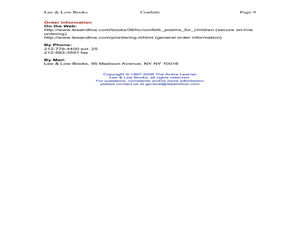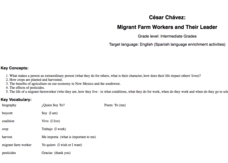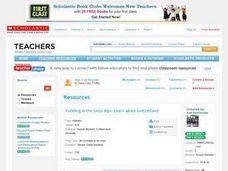Curated OER
Confetti
Third graders complete pre reading, writing, during reading, and interdisciplinary activities for the book Confetti. For this reading lesson plan, 3rd graders complete journal entries, go over vocabulary, answer short answer questions,...
Curated OER
Lesson Plans for Sweet Dreams: How Animals Sleep
Students explore the sleeping patterns and sleeping habitats of animals. In this where animals sleep lesson, students research different animal species. Students also write and illustrate an animal picture book, make connections...
Curated OER
The Big, Bad Wolf
Seventh graders analyze the stereotyping of wolves in children's literature. They compare stereotypes and facts about wolves. They rewrite a fairy tale from the wolf's point of view.
Curated OER
Cloudy With a Chance of Meatballs
Fourth graders participate in a play to work on seeing events from a different perspective. Some of them are reporters, some cameramen and women, and others are interviewed. They put themselves in the shoes of the people in the book...
Curated OER
Once Upon a Genre
Students examine fractured fairy tales before responding by writing in many different genres including a persuasive essay, a personal narrative, a letter, an advertisement, and a resume'. They create a pop-up book with their written...
Curated OER
Character Profile
Students exemplify non-stereotypical behavior. In this character education lesson, students read Pink and Say and discuss the negative effects of judging people on superficial characteristics. Students fill in a chart how they felt about...
Curated OER
Our Community
Students explore their community. In this communities lesson, students write an interesting fact about the community on lined paper and add illustrations to their writing. Students construct a class book by combining each page of...
Curated OER
Harry Potter Debate
Young scholars read a short article about the upcoming release of the new Harry Potter novel. They debate the issues surrounding the marketing of students's books and films after internet research to support or oppose the topic.
Curated OER
The Loud Trout Shouts!
Students practice the strategies of phonemes and digraphs dealing with the correspondence "ou"=/ow/ in both spoken and written words. They listen as the book The Napping House by Audrey Wood is read to them and then they interact with...
Curated OER
Parts of a Tree
Students identify four parts of trees. In this plant biology lesson, students read the book Trees and conduct Internet research to identify the parts of the tree. Students take notes from each website and complete an included worksheet.
Curated OER
Pigs Love Pink Pancakes
Students explore the grapheme along with phoneme it represents. The teacher teaches letter reconginition by having the students write the letter and practice the sound. This helps studens investigate the letter faster (p). Students...
Curated OER
Mother Teresa
Students research Mother Teresa. In this philanthropy lesson, students research Mother Teresa and list the characteristics that makes her a hero. Students identify and write about a hero in their life.
Curated OER
About the Author: Kate DiCamillo
Students examine the writing process of Kate DiCamillo, the author of "Because of Winn-Dixie." They read author's comments, watch a slideshow narrated by the author, complete a free-write activity, and discuss Kate DiCamillo's top five...
Curated OER
The True Story of the Three Little Pigs
Learners explore expressive reading. In this literature lesson, students read the book The True Story of the Three Little Pigs and interpret key themes. Learners perform a different version of the text.
Curated OER
Fabulous Fossils
Students investigate how fossils are formed. They read the book, "Digging Up Dinosaurs," examine fossil samples, create a fossil imprint using play-doh, and complete a Fossil Questionnaire activity sheet.
University of New Mexico
César Chávez: Migrant Farm Workers and Their Leader
During the first week of instruction, middle schoolers research biographies on Cesar Chavez and make a pictorial collage of his life. For the second and third week, they maintain a seven-day diary of a farmworker and write a poem. For...
Curated OER
Comparing Sea Horses and Knights
Students investigate sea horses and knights. In this marine biology lesson, students read the book How to Hide an Octopus and discuss the purpose of camoflage. Students research knights and sea horses and record their research on...
Curated OER
Border Legends, Myth, & Folklore
Young scholars examine the narrative forms and tales unique to the U.S.-Mexico border. They discuss the possible sociological meanings of these stories, and then write their own versions to demonstrate that they explain the forms.
Curated OER
How Should Our Gardens Grow?
Students examine different types of land use by humans and evaluate the ways land is used in their local community. They also consider the environmental effects of the different types of land use. Students assume the role of community...
Curated OER
Sorting Out Homophones in Roald Dahl's
Students explore the concept of homophones. In this homophone instructional activity, students use a selection from the book Matilda to review homophones. Students use a web to identify homophones.
Curated OER
The Rest of the Story
Third graders make predictions about the story "The True Story of the Three Little Pigs" based on background knowledge. They read the story, stopping to verify or reject predictions. They write their own opinionated fairytales.
Curated OER
Yodeling in the Swiss Alps
Students become familiar with the country of Switzerland, its geography and yodeling music. In this Switzerland instructional activity, students recognize that Swiss cheese is a producct of Switzerland and write about the process...
Curated OER
Louisa May Alcott
High schoolers explore life of author Louisa May Alcott, define Transcendentalism, discuss the children's books Alcott wrote, read two selections she wrote, and compare the writing style of one of her children's stories with a story she...
Curated OER
Is That a Fact?
Third graders listen to a paragrah as it is read and write down points that they think are important. They answer several comprehension questions to check for understanding of the passage. They then read pages in their science text book...























